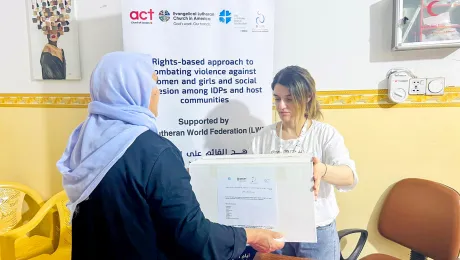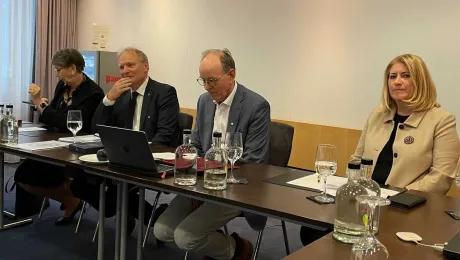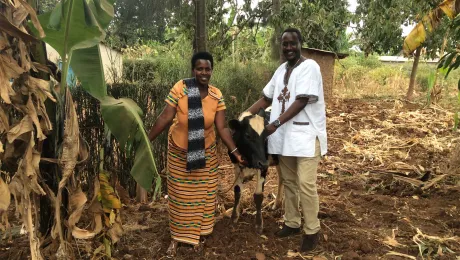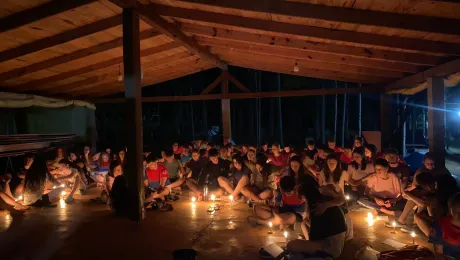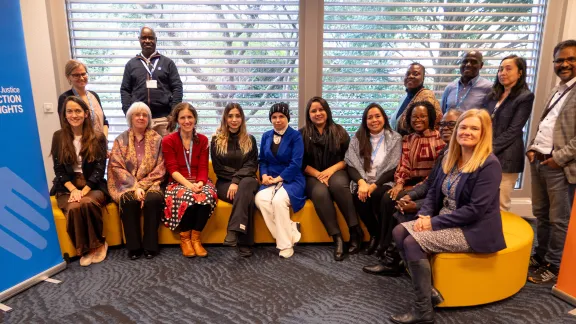
Participants in the 16 Day Campaign event hosted by the LWF and WCC in Geneva. Photo: LWF/P. Mumia
LWF and WCC launch annual campaign on an issue affecting “one out of every three women”
(LWI) – Panelists at an ecumenical launch of the 16 Days of Activism to end gender-based violence affirmed churches’ important contribution in bringing “the change that is needed” while also urging increased solidarity and action to empower survivors working for transformation in “deeply entrenched” cultures across the world.
The Lutheran World Federation (LWF) and World Council of Churches jointly hosted the event at the LWF Communion Office in Geneva, with gender justice advocates from El Salvador and Iraq sharing how pushing for the rights of women and children at the global United Nations (UN) level impacts the local situation of survivors themselves. This year’s theme for the 25 November –10 December campaign, is “Towards 30 Years of the Beijing Declaration and Platform for Action: Unite to End Violence against Women.”
Ms Helan Muhammed, Program Coordinator and Gender Focal Point for the LWF country program in Iraq reflected on the resilience of Iraqi women. “Despite adversity, many women have emerged as educators, activists, and leaders,” she said, crediting their courage as a driving force in her advocacy.
Muhammed said the key challenges for women include domestic violence, honor killings, child marriages, and insufficient legal protections. “Domestic violence remains pervasive, yet survivors often face stigma and lack of support when coming forward,” she explained. She cited cases of former women captives of the ISIS extremist group, who were raped by their captors and bore children as a result. Upon release, these women were rejected by their families, communities and local authorities, because children born out of marriage are not socially accepted and they are also considered stateless. “It is a very hurtful situation. The mother is blamed for getting pregnant, the husband and community reject her, and the child born out of rape is not recognized by the government and is unable to go to school and live a normal life.”
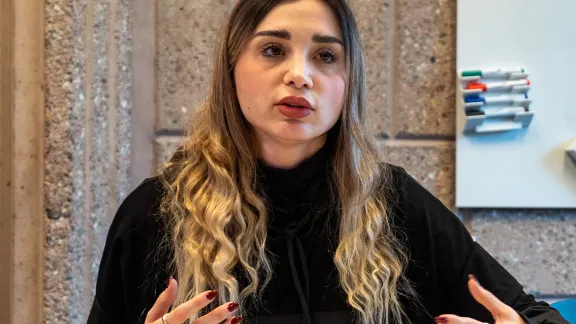
Ms Helan Muhammed, Program Coordinator and Gender Focal Point for the LWF country program in Iraq, presenting the concerns for women in her country. Photo: LWF/A. Danielsson
Effective strategies such as engaging traditional and tribal leaders to build community trust, empowering household economies through microfinance initiatives, have contributed to community resilience. “When I see the resilience of Iraqi women educators, mothers, and human rights advocates I know there is hope,” she added.
Muhammed commended the LWF supported advocacy at the UN Human Rights Council through the annual Universal Periodic Review (UPR) mechanism that enables civil society organizations to critique how governments address human rights’ violations at the local level. In 2023 she participated in the Women's Human Rights Advocacy Training, hosted by the LWF and partner organizations in Geneva, with topics on UN processes including UPR. “We have done a lot of dialogue, and talked a lot at the global level, now is the time for real action that changes the lives of survivors,” she stressed.
“We have done a lot of dialogue, and talked a lot at the global level, the time is now for real action that changes the lives of survivors”
Ms Helan Muhammed, Program Coordinator and Gender Focal Point, LWF country program in Iraq.
Education is key
Salvadoran Lutheran Church pastor Rev. Arisbe Abelina Gómez de Rauda, and gender justice advocate shared alarming statistics about the prevalence of femicide and early pregnancies in her country, whose UPR was also presented at the UN body this year alongside Iraq’s. “In El Salvador, 28 girls, aged between 13 and 18 years old, become pregnant daily, many as a result of sexual violence. And, out of the 97,000 cases of violence against women reported this year, only around 8,000 were brought to justice,” she remarked, highlighting the major gap in enforcing prosecution.
Gómez criticized the removal of comprehensive sexual education materials by the Salvadoran Ministry of Education as a key impediment, calling it a violation of children’s rights. The Lutheran pastor stressed that the church has a vital role in transforming these realities, advocating for justice grounded in faith. “We need to do more, because the rate has increased … and these numbers also indicate that there is also a lot of silence from victims of violence.”
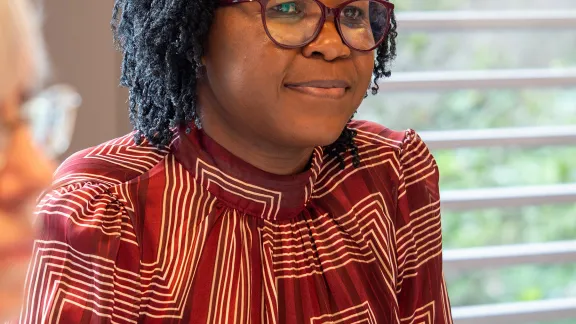
Ms Sikhonzile Ndlovu, LWF Senior Advocacy Officer for Gender Justice. Photo: LWF/A. Danielsson
Gómez stressed Christians’ primary focus on the gospel of Christ and the church’s prophetic role of “defending justice and the rights of the weak and guaranteeing peace and protection for all those in need.” Her calling, she said, “is to connect with survivors of violence,” in order to fight the cultural legacies of colonialism and stereotypes that perpetuate gender-based violence. “The church must be a beacon of support, but this requires preparation, education, and action.”
Human life behind the statistics
The focus on numbers and the real stories, tragedies and lives forever changed was discussed in reference to the message by LWF General Secretary Rev. Dr Anne Burghardt. In her video message, she emphasized the urgency to denounce sexual and gender-based violence as “an expression of sin” and one of “the most pervasive violations of human rights” in a global context in which “one in every three women” will experience such violence in their lifetime.
“It is not just about numbers, it is human life, because many of these women have died,” added Ms Sikhonzile Ndlovu, LWF Senior Advocacy Officer for Gender Justice. The 16 Days Campaign, she said, serves as a platform to amplify such stories, encouraging global collaboration to end gender-based violence.
Rev. Nicqi Ashwood, WCC Program Executive for Just Community of Women and Men commended the panelists for sharing their stories and “inviting all of us to be the change that is needed.” She said increased collaboration between churches and other stakeholders is still needed, even as the world looks forward to marking 30 years of the 1995 Beijing Fourth World Conference on Women which produced a Platform for Action with 12 critical areas of concern, including violence against women and girls. “A survivor does not carry a particular profile neither does a perpetrator,” she added.
Other panelists included Ms Andrea Rivera, Regional Program Coordinator of the LWF World Service Central America program, and Ms Shireen Salih Hassan, Project Assistant at the University of Duhok’s Center for Peace and Conflict Resolution, which partners with the LWF in its humanitarian and development work in Iraq.
